#the Entities are not fundamentally distinct... well... entities
Text
So I'm writing my term paper about The Magnus Archives and have been relistening to season 1 as a way to try to organize my thoughts and Fuck I Miss This Podcast
also i hate how it ended even more bc a running theme throughout the podcast UNTIL THE VERY END is how inescapable the Entities are. We see all sorts of attempts to avoid or thwart them and sometimes they do work for a while, but I think we forget that even absolute icons like Joshua Gillespie or that guy who left the Spiral because he was going to be late for dinner still were impacted enough by their experience to come to the Magnus Institute in the first place
And that by coming there Guess What They're Lowkey Marked By
I don't care what the Magnus Protocol or any part of canon will say/says, the Entities should not be banishable. Not without some kind of massive psychological shift in all life on Earth that eliminates fear.
Do you know how many of the S1 statements talk about watching? Nearly all of them involve it, of course because that's the easiest way to show gruesome spooky things + justify why there's someone alive to tell the tale, but in the context of TMA, I think it's extremely important that it's brought up in nearly every statement
There's always a point where the statement givers comments about their watching: they stay in a Situation longer because some part of them wants to see, they feel they can do nothing else so they watch, they return to the location of the Situation after it has initially passed, there's always a point where they could have left it alone but they don't because they feel like they can't.
The avatars might have petty squabbles between themselves about their "respective" patrons. But the Entities themselves seem very content to give a sizeable portion of those they've marked, at least partially, to the Eye.
#tma#the magnus archives#tma the entities#tma the eye#mine#in other words: I Maintain That The Entities Are All Friends Actually#well#not friends#but not divided into neat little clans like smirke and co. believe#i hate jurgen leitner but his analogy about an ant trying to understand a human is very very salient#except where i'm pretty sure based on how canon plays out he's talking about individual manifestations of one entity vs the entire entity#i'm choosing to interpret it as one entity vs That Which Is Fear#the Entities are not fundamentally distinct... well... entities#but parts of a fractured whole#it's no cosmic skin off their metaphorical backs if a victim of one entity ends up claimed by or serving another#they're just trying to get as much tasty tasty fear as possible#i think of them like a bunch of mouths that all lead to one stomach#sometimes they might go for the same target#iirc it's either ivo lensik or father burroughs(?) who is compelled to call out 'i'm already marked. i'm not for you' or something to that#effect#but anyway yeah sometimes they're essentially trying to extract fear from the same source in different ways#and one 'mouth' will kinda say to the other#'hey i think i can do this best buzz off'#and sometimes they listen#but there are also times where they basically draw and quarter a motherfucker#like father edwin burroughs(?)#(i forget how his last name is spelled)#who was gangbanged by nearly all the entities#which is hilarious to listen to in retrospect#bc this man just goes out of one frying pan and into several fires
11 notes
·
View notes
Text
i love that the winged lion is essentially a parasite brought to this world by humans, which then went on to destroy the ecological balance. at first it was mere energy, with no reason or intention or form, simply going through the natural process of learning to interact with the new world it was brought into. so when that entity eventually came to learn of taste, of hunger, it was then given a name by humans. they made it a god and when it was no longer solely sustaining them but instead consuming, taking from them as well, they made it into a demon, though nothing had changed. this entity kept desiring to taste more and more, accepting of its hunger being regarded as satanic and evil; as it didn't have a concept of right and wrong to begin with. hunger has no concept of right and wrong. it completely gave in to a pleasure out of its world, just like humans did and do and will continue doing, no matter how much they try to hide their own hunger. so who are they to criticize it, when it's adopted the simple mechanism of every living being? there's only one glaring distinction between them: the winged lion does not consume to live. the endless power chose desires, despite all their limitations, despite knowing it might very well hunger for eternity. and in that lies its most human trait, what makes humans its greatest inspiration out of all the beings it came into contact with.
so i think laios's choice at the very end not to erase the winged lion's memory but embrace it is also a way of taking responsibility for humans bringing the "demon" to life and eventually taking everything back. it which was "born" from humans' desires was then returned to nothing and, fundamentally, everything. when you think of it that way it's as much a god as it is a worm. nothing and everything all at once, just like at the very beginning. just like humans.
#dungeon meshi#<- PLS CHECK THE REBLOGS I ADDED SOME STUFF I AM SO NOT NORMAL RN#'im not gonna elaborate' (proceeds to elaborate)🤡
496 notes
·
View notes
Text
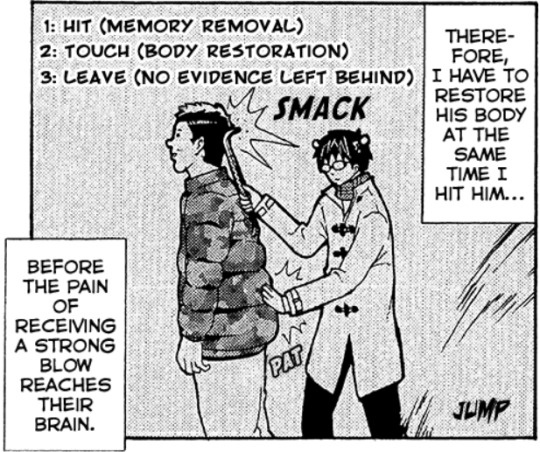
ok i want to jot down some quick notes on kusuo's restoration ability. Kusuo says in the above panel that he needs to restore his target's body before the pain reaches their brain, which implies that his restoration power doesn't work on the brain. That, and the fact that people don't typically lose their memories when he reverses time on them (see: kuniharu begging kusuo to heal him after he stubs his toe). Memories are just pathways in the brain, so they should be reset if this power actually affected them.
I've wondered if, perhaps, the brain is immune to his power, but i think that's a backwards way of thinking about it. Rather than proposing the brain to have a Special Feature™ which renders Kusuo's restoration power null, i think it's way more likely that Kusuo's powers are making the active decision to skip over them.
So. why would this be? I think it has to do with the drawback he mentions in chapter 9:

When using restoration, "all the things nearby also end up affected." That description might be a little deceptive because it's easy to assume that "nearby" means everything within a certain radius will be affected, but in later chapters that's clearly not the case. Take this section from chapter 103:

When Kusuo restored the hole he made in this wall, his power travelled across the length of the wall, but did not extend perpendicularly to affect the people, houses, street, etc. near it. So it may be more accurate to say that when Kusuo tries to restore an object, his powers will automatically identify that object as one small part of a larger system, and then proceed to reverse time on that entire system.
Typically, this is a very intuitive process. Reverse time on a wall, his entire house gets restored. Reverse time on his video game controller, his entire gaming setup will be restored. Reverse time on the volcano, the entire Earth will be restored. However, the brain vs body situation is not intuitive.. or at least not to me at first glance. But for Kusuo, it may well be.
A huge part of Kusuo's worldview is dominated by the difference between people's thoughts, and people's actions. Brain vs. Body. That sentiment is the very first thing we see in chapter 1:

Even in Volume 0, when Saiki only existed as a series of oneshots, before serialization. Chapter 0.1 is all about Kusuo's telepathy. And we're greeted with panels like this:
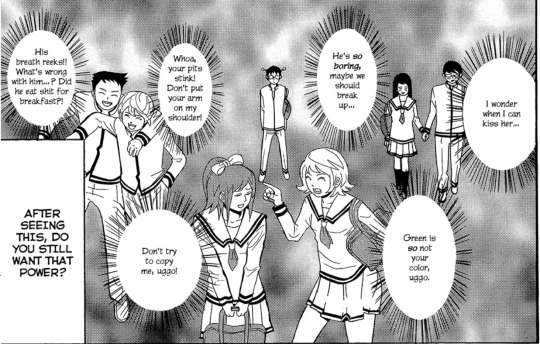
which display a huge gap between appearance and thought. Many major characters also play into this concept: Nendo (looks thuggish but can be very kind), Teruhashi (appears perfect, is not), Kuusuke (displays himself as a charming and trustworthy graduate of cambridge, is actually verrry fucked up), etc. Kusuo himself hides his psychic, genius brain behind a facade of normalcy. It's an absolutely fundamental aspect of the series.
So again, why shouldn't Kusuo feel a distinct separation between the brain and the rest of the body? And why shouldn't this belief express itself through one of his most used powers? His powers aren't some separate, unknowable entity doing whatever they want to inconvenience him- they are him. And I think this is a good example of that.
sidenote: a silly little scenario i've considered before is whether kusuo could make someone effectively immortal by reversing time on them every day, but since his powers skip over the brain, I'm now sure the answer to that question is "no." Unless, of course, he made an effort to access the brain directly, but even with all the dark stuff in this show, i don't think kusuo's ever reached into someone's skull to get directly at their gray matter. now wouldn't that be something..
229 notes
·
View notes
Text
The plain fact is that whatever Homer or Aeschylus might have had to say about the Persians or Asia, it simply is not a reflection of a ‘West’ or of ‘Europe’ as a civilizational entity, in a recognizably modern sense, and no modern discourse can be traced back to that origin, because the civilizational map and geographical imagination of Antiquity were fundamentally different from those that came to be fabricated in post-Renaissance Europe.
[...] It is also simply the case that the kind of essentializing procedure which Said associates exclusively with ‘the West’ is by no means a trait of the European alone; any number of Muslims routinely draw epistemological and ontological distinctions between East and West, the Islamicate and Christendom, and when Ayatollah Khomeini did it he hardly did so from an Orientalist position. And of course, it is common practice among many circles in India to posit Hindu spirituality against Western materialism, not to speak of Muslim barbarity. Nor is it possible to read the Mahabharata or the dharmshastras without being struck by the severity with which the dasyus and the shudras and the women are constantly being made into the dangerous, inferiorized Others. This is no mere polemical matter, either. What I am suggesting is that there have historically been all sorts of processes – connected with class and gender, ethnicity and religion, xenophobia and bigotry – which have unfortunately been at work in all human societies, both European and non-European. What gave European forms of these prejudices their special force in history, with devastating consequences for the actual lives of countless millions and expressed ideologically in full-blown Eurocentric racisms, was not some transhistorical process of ontological obsession and falsity – some gathering of unique force in domains of discourse – but, quite specifically, the power of colonial capitalism, which then gave rise to other sorts of powers. Within the realm of discourse over the past two hundred years, though, the relationship between the Brahminical and the Islamic high textualities, the Orientalist knowledges of these textualities, and their modern reproductions in Western as well as non-Western countries have produced such a wilderness of mirrors that we need the most incisive of operations, the most delicate of dialectics, to disaggregate these densities.
Aijaz Ahmed, In Theory: Nations, Literatures, Classes
314 notes
·
View notes
Text
It's not miscommunication that's the problem
TL;DR - Crowley and Aziraphale can't talk about heaven and good because those things don't mean the same things to them. Their experiences are fundamentally different, so they will always miscommunicate and misunderstand.
OK. I know I have 3 big things going against me: you don't know me, this is amazingly long and miscommunication is the problem. Please hear me out.
In a simple view, miscommunication is the problem but the cause of that miscommunication isn't the fundamental issue. Aziraphale and Crowley are two fundamentally different beings and I don't know how they can bridge that experience gap. Heaven, the Plan and especially God are different CONCEPTS for our boys. It starts with who they were as angels when they were both in heaven BEFORE the beginning.
From the moment Crowley calls Aziraphale to help, we are aware that Crowley is a powerful angel. It's also apparent that he's excited, engaged, joyous and creative; all things we will see less of when he is on earth. I don't it occurs to him to introduce himself to Aziraphale partly because he is so engrossed in unleashing his passion project and partly because he's used to being recognized. In their discussion, two major facts become clear about how we need to frame Crowley's relationship with God, the Plan and heaven. First, his relationship with God and the ineffable Plan is personal. More so than just how he believes in it, but that God is his Mother and Crowley's experience with heaven much more resembles a family or close network and less a disembodied corporation. His comment about Gabriel coming to look at his statue in the graveyard is that of a brother, not the distant observation of an archangel in authority.
Second, we see that his understanding of the Plan is that it is dynamic and evolves to always push forth the greater good for everyone. "Good" isn't an abstract to be applied but rather a mandate to be lived. It's beauty and peace and love and wellbeing. I believe from the moment he hears that things will end in 6,000 years, Crowley believes that there is a misunderstanding between what God wants and what her "staff" is executing. I think for him heaven and God are two distinct entities and that heaven fucks things up (means to an end) when his somewhat flighty, even a little vain, Mother isn't paying close attention. We see his disgust in the Noah, Job and Caligula minisodes, part of that disgust is disbelief that his Mother could be that cruel, another part disbelief that heaven could be that stupid and inefficient.
If I were doing a literary analysis, I would say that Crowley is representative of our personal relationship with God and spirituality. Crowley's trauma with the fall is more about being rejected as a child for disappointing his Mother, than not being part of heaven and the good guys. We see that when in crisis he talks directly to God (ex. when hell figures out he's lost the Antichrist or "Oh God." when Aziraphale rejects him). In the Job minisode, we see him wistful for the opportunity to ask God a question, to talk to her. For him "heaven" is toxic because of how the corporation is executing the Plan. God and goodness is not. He rejects being reinstated as an angel because he doesn't need to be a "good guy" or have the corporation's mistake fixed. He wants the "furniture of his Mother's love and family relationships" to be restored. That's beyond the power of heaven and it's something that Aziraphale fundamentally doesn't understand.
Aziraphale is a lower functioning angel in heaven who is constantly helping. He experiences heaven from a more distanced perspective. He is raised in the confines of heaven, the corporation, and has the structure of this organization repeatedly forced on and drummed into him. Heaven never treats him well and he does experience a tremendous amount of trauma. He struggles with the need for affirmation and approval and is so aware that his co-workers don't think highly of him. From a literary standpoint, I'd say that Aziraphale represents our relationship with organized religion and society as a whole. "The Almighty" isn't a personal concept for him. It never occurs to him to directly address God, even if he knows that she's ultimately running the show. He appeals to a higher authority, but never God. Sadly, I don't think that Aziraphale ever experiences a parental relationship or a family's bond, ever. I think that lack makes the ineffable plan an esoteric concept that he should aspire to even if he doesn't really get it, much like a corporate mission statement. It's not until he has to "act local" and is suddenly presented with the ugly consequences of the Plan that the plan becomes real. To his credit, in that moment of realization, Aziraphale works his ass off to fix it for the better (see the Job minisode) usually with Crowley's help. I love him desperately, but he's not a global, big picture guy as we see in the end of season two ending. He thinks he's offering Crowley salvation and a chance to be together and do that ineffable "good" he clings to, however, Crowley sees the global concrete implications for not only them, but the rest of everything.
Aziraphale would never intentionally hurt Crowley. For him, reinstatement to heaven is like checking a box, righting a gross wrong. He knows that Crowley is good, that's not at issue. He cannot fathom that overwhelming wealth of hurt that Crowley carries from the fall, that personal judgement from God that Crowley "disappointed her." He doesn't understand that heaven can't reinstate that. Because of that inability to understand how Crowley sees God and heaven, he can't understand why Crowley doesn't want to be a part of heaven.
When Aziraphale is confronted by the archangels for conspiring with his "boyfriend" in season one, he never denies the relationship or really even blinks. I think his exposure to the concepts of love in literature has formed his view of his relationship with Crowley to unrequited love. He has physically moved closer to Crowley over the series, but he believes it has to remain unrequited because of the whole "rules of heaven" and consorting with the "enemy" thing. Crowley, bless his heart, feels love and because of its power (and probably the slow burn) relates it to the only love he's ever known, family. When Maggie and Nina explain that it's not that kind of love, he's free of the family implications. He's seen romantic love in the movies and can move forward. He even knows from Gabriel and Beelzebub that they can move forward. Then when he expresses his love, gives voice to the longing in his heart, the global implications of heaven and their plan and what he believes is confirmation of Aziraphale's judgement of him crush him.
I don't believe that Aziraphale will ever be able to understand how Crowley views God and heaven until he goes to heaven and sees the disconnect for himself. Then he has the foundation to understand why.
If you made it this far, thank you for reading.
#neil gaiman#ineffable husbands#crowly x aziraphale#good omens theory#good omens season 2#good omens#pay our writers and artists so we can all have a happy ending#good omens season 3
160 notes
·
View notes
Text
So I recently saw some discussion on Luz being a ‘Chosen One’-type character. And it really got me thinking about how Luz is, if not an outright subversion, certainly a very interesting exploration and twist on the ‘Chosen One’ trope.
See, Luz technically fits most of the criteria for being a Chosen One, namely being ‘chosen’ by a greater/higher power (the Titan) and gifted great power (glyphs) which she winds up using to defeat the big bad (Belos). However, when we look at the context, execution and subtle nuances of Luz’s relationship with the Titan, we see a lot of differences from what we would expect from a more ‘typical’ Chosen One.
Consider for a moment when most Chosen-Ones are actually ‘chosen’. Usually it’s from the moment they’re born, or in some cases even long BEFORE even that. Alternatively it’s at the very start of the story as part of whatever inciting incident kicks off the protagonist’s role in the plot. Basically, a protagonist being a ‘Chosen One’ is almost always closely tied up in whatever is bringing them into the story in the first place.
But that’s NOT what happened with Luz. She’s not some ‘destined savior’ who was singled out by the Titan when she was born, or even when she first entered the Boiling Isles. No, the first time Luz became known to the Titan (barring time-travel chicanery*) was almost certainly when she began to befriend their son.
I mean, think about this: it’s not until episode FOUR that Luz actually becomes ‘chosen’ by the Titan when they show her the first glyph.
On top of that, there is nothing ‘destined’ about the Titan showing Luz the glyphs. I mean I think it’s pretty clear that the first time they showed Luz the light glyph they were simply trying to help Luz and King to pacify Eda. And after that, they kept showing Luz more glyphs… simply because they wanted to.
The Titan didn’t show Luz the glyphs as part of some grand, thought-out plan for her to defeat Belos and bring peace to the Boiling Isles. Luz didn’t pass some ‘secret test of character’ to become ‘chosen’ by the Titan. She was simply kind and befriended King, and so the Titan decided to just… help her out. First by showing her the first couple glyphs and then showing her more because, well… they LIKE Luz.
The Titan may fill the role of some greater, higher power of the series, but when we finally meet them, they aren’t really presented as one. The Titan is characterized as being quite grounded and down to earth. For all of the incredible power and influence they have over the series, the Titan isn’t presented as some ‘godly’ figure, but simply as ‘King’s Dad’. And not even in some ‘all-knowing, omnipotent entity taking on a form the protagonist can comprehend’ way either (see Amphibia’s finale), but instead simply as a person who wanted to do the right thing, made some major mistakes, and now in large part just wants their son and his new family to be safe and happy.
Again, it all frames the Titan reaching out to Luz to show her the glyphs not as part of some grand plan to defeat Belos or some other ‘destined purpose’, but as the Titan simply wanting to help Luz.
Contrary to what I think a lot of people think, I would call Luz’s story fundamentally distinct from the typical ‘Chosen One’ narrative. Despite the surface-level similarities her story might have, there is nothing ‘destined’, ‘predetermined’ or ‘chosen’ about Luz’s story. She really did stumble through Eda’s portal door chasing Owlbert by pure chance. And it wasn’t some hidden, secret, inborn ‘quality’ about Luz that led to her receiving knowledge from the Titan, or even pure, random happenstance either. Luz simply befriended the Titan’s son and slowly grew into his adoptive older sister.
Just as Luz’s friendliness, kind heart and love for the Boiling Isles and its people endeared her to Eda, King, Amity and so many others, it also endeared her to the very Titan themself.
*If anyone is going to bring up the time-travel point, I would like to remind everyone that is the ‘Stable Time Loop’ trope. NOT ‘The Chosen One’ trope.
#toh#the owl house#toh analysis#toh rambling#Luz Noceda#toh the titan#King Clawthorne#discussing narrative tropes#the chosen one#subverting tropes#how luz unintentionally stumbled into chosen-one status through sheer power of friendship and found-family#when the higher powers make you the chosen one because they think you're pretty cool and you've been really nice to their kid
178 notes
·
View notes
Text
Mental Gymnastics: "Presence" now means "displaying"

There is a lot here to unpack.
As always, this take pretends the example of spiritual practices (because most endogenic plurality and the oldest forms of endogenic plurality are spiritual) means only spiritual practices are covered. It tries to take broad language and make it super specific.
But what I find more egregious here is framing the "presence" of multiple personality states as describing what people are displaying rather than experiencing.
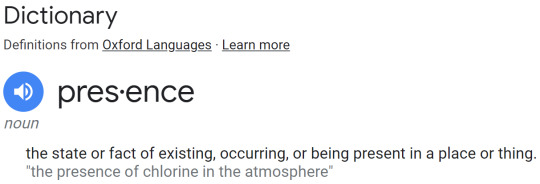
If, as they suggest, this was meant to refer only to multiple distinct personality states being displayed, it could have easily used a term like "appearance."
Instead, they choose a term that treats it as an objective fact that multiple distinct personality states exist in both DID and these spiritual practices.
Oh, and about that wording and how the ICD-11 uses "distinct personality states (dissociative identities)" for DID and just "distinct personality states" for non-DID things...
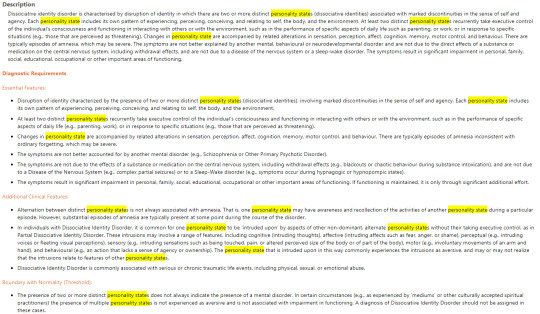
It's true that "dissociative identities" in the five times it's used, including the two in parentheses, is only used to refer to the distinct personality states in DID. And this is a small distinction. But "personality state(s)" is used far more frequently to refer to alters in the text.
Perhaps the argument here is supposed to be that because only one group is referred to as dissociative identities, then that means those personality states are something fundamentally different. That would be more reasonable than trying to argue that "presence" doesn't actually means "presence."
In which case... okay?
The main point isn't really to show that the World Health Organization sees alters in DID as being the exact same thing as non-disordered headmates. Only to show that the World Health Organization acknowledges the existence of non-disordered plurality (that is to say, multiple distinct agents sharing the same body) as a real phenomenon.
The question of the relationship between these distinct personality states and alters really doesn't matter.

Really? Then why refer to the "presence of multiple distinct personality states?"
Boundary with Trance Disorder and Possession Trance Disorder: Trance Disorder is not characterized by the presence of two or more distinct personality states. In Possession Trance Disorder, the individual’s customary sense of personal identity is replaced by an external ‘possessing’ identity, which is attributed to the influence of a spirit, power, deity or other spiritual entity. Behaviours or movements are experienced as being controlled by the possessing agent. Individuals who describe both internal distinct personality states that assume executive control as well as episodes of being controlled by an external possessing identity should receive a diagnosis of Dissociative Identity Disorder rather than Possession Trance Disorder.
Notice that at no point does this use the term personality state in reference to these external agents in Possession Trance Disorder. Compare that to the wording of the Boundary With Normality.
The presence of two or more distinct personality states does not always indicate the presence of a mental disorder. In certain circumstances (e.g., as experienced by ‘mediums’ or other culturally accepted spiritual practitioners) the presence of multiple personality states is not experienced as aversive and is not associated with impairment in functioning. A diagnosis of Dissociative Identity Disorder should not be assigned in these cases.
If the Boundary with Normality was only meant to cover possession from external agents, they easily could have lifted the exact same wording from the Possession Trance Disorder entry.
It's not an accident that personality states is used in reference to the boundary with normality and NOT the boundary with Possession Trance Disorder.
It would have been easy to phrase this as something like this:
"In certain circumstances, (as experienced by mediums and other culturally accepted spiritual practitioners,) an individual's customary sense of identity may be replaced by an external ‘possessing’ identity, which is attributed to the influence of a spirit, power, deity or other spiritual entity. Behaviours or movements are experienced as being controlled by the possessing agent. The alteration in identity is attributed to an outside agent, is not experienced as aversive and is not associated with impairment in functioning. A diagnosis of Dissociative Identity Disorder should not be assigned in these cases."
There's an intentional choice to refer to these as "personality states" and to never refer to them as external, as opposed to the very clear wording used in relation to Possession Trance Disorder.
Why?
Presumably, it's because the wording was always meant to be broad enough to apply to a larger variety of circumstances than the specificity of Possession Trance Disorder.
Lastly, a reminder that plenty of endogenic plurals DO attribute their plurality to external agents.
#syscourse#endogenic#pro endogenic#pro endo#multiplicity#plural#plurality#sysblr#system#systems#plural system#endogenic system#system stuff#psychiatry#psychology#mental health#world health organization#world health organisation (who)#actually a system#actually plural
22 notes
·
View notes
Text
On the Endless and Their Aspects
I’ve been discussing the Endless a lot with people lately, and it’s gotten me to pull out two facts from the comics that are never explicitly stated, or are stated so fleetingly that it’s easy to miss their actual impact. I say “facts” and not “theories” or “headcanons” despite this, because I think the evidence for the validity of these is clear enough that it’s more a matter of pulling out what canon shows us but doesn’t shove under our noses screaming “LOOK AT THIS COOL THING” than it is attempting to connect the dots on a bunch of disparate canon moments in some coherent way. There will be spoilers for the Sandman comics in this.
The first fact is that each Endless is not only the personification/embodiment of their own aspect, but also the force that defines their opposite concept. We see this clearly with four of the seven, I think, and then it’s up to speculation with the other three, but with 4 being shown so clearly it’s safe to say that they all work this way.
Destiny defines free will. We see this in the branched paths of his garden, constant choices for the walker to make, and in the implication that even he may not know which path a walker will choose. We also see this near the end of The Kindly Ones, when Destiny is suddenly confronted by an untold number of alternate versions of himself, which then gradually disappear as the other characters make their choices. Not even Destiny knows which of them is the “true” version. It is, in all truth, possible to read this as suggesting that destiny itself has fractured and become unstable because of the exact nature of the events, but I think a more plausible reading is that these alternates always exist, all unaware of each other, and events merely caused them to become visible to one another temporarily. (Also I will stop to point out here that Destiny is distinct from Fate in the Sandman cosmology.)
Death defines birth. She’s the one Endless we see directly engage with the duality, because she’s present at birth as well as at death. That’s actually what tipped me off to look at them as potentially really being composed of pairs of opposed concepts rather than a single idea/state.
Dream defines reality. We actually do see this in action as well, when a critical mass of dreamers recreate the universe in the image of their dreams. This is also part of why the Vortices are such an existential threat to the world. Destroy dreams and you no longer have an anchor for reality.
Destruction defines construction. (Not creation, some things that are created cannot be destroyed.) Destruction doesn’t seem to realize this himself, but he also says it outright when he describes his realm as full of entities constantly building things to destroy. (There is possibly a joke about Derrida’s theory of deconstruction here, especially because deconstruction rests on the concept of exposing internal oppositions and contradictions, and also denies that any text can ever contain a single meaning, which is very like what I’m currently arguing is true of the Endless themselves.)
Now for the three that aren’t so explicit in the text:
Desire defines indifference, I would guess, and Despair defines hope. What’s interesting about that assumption is that the twins each closely relate to each other’s opposites. To be capable of desire or wanting presupposes the ability to hope for something, and Despair rests on the fundamental indifference of those who have lost the ability to want anything better. In that sense they define each other, which is what makes them twins.
I assume that Delirium’s opposite is Delight, but I’m not sure of that. It would be interesting if that were true, though, because it would suggest the possibility that any of the Endless might be able to change and embody their opposite the same way she did.
Part two of this is closely related to this, because it again rests on the fact that they are fundamentally indistinguishable from their aspects. When Death walks among us, death walks among us. There’s no separating them from what they are. This rests mostly on something Delirium says in Destruction’s chapter of Endless Nights, which is that the strange future artifacts are there because Delirium and Destruction are there. And of course, their presence makes no logical sense, and everything they find foretells destruction. They exist because the presence of Delirium and Destruction influences the world around them, because their names are literal. We also see it throughout Brief Lives, where throughout Dream and Delirium’s search for Destruction, not only is destruction constantly around them, but also in order to find him, Dream at last sets himself inevitably on the path to his own end, but also his own emotional devastation. He’s arguably destroyed before he dies.
Having said that, what does that seem to mean for Dream’s presence in the waking world? Because he doesn’t seem to carry dream-logic with him or anything as obvious as that. But he is also the Prince of Stories, and he could be argued to carry narrative with him, such that people around him, who would otherwise be ordinary people, become enmeshed in capital-s Stories with clear narrative roles. It is even possible that this is a major force behind the constant failure of his love affairs, because a grand passion is a very good story, but those stories are very difficult to live in for any great length of time. And to make matters worse, Dream himself says, at the very end of the series but also hundreds of years before the climax, that he “[has] no story of [his] own, nor may [he] ever.” It’s impossible to be caught up in a grand romance plot with a being who cannot also participate in that plot. It’s absolutely doomed. Arguably, the only way to co-exist with Dream for any length of time is to have a part in a narrative that makes that coexistence possible. (Arguably, for example, this is one of the things Death does with Hob: she doesn’t just make him immortal, she arranges a story that will allow him to continue to be who and what he is without Dream’s existence in his life taking it over with some other narrative.)
96 notes
·
View notes
Text
Colours of the Lands Between (1/?)
Wanted to get this out of my head.
Not a coherent lore theory, just throwing out ideas and rambling about colour and factions in ER.
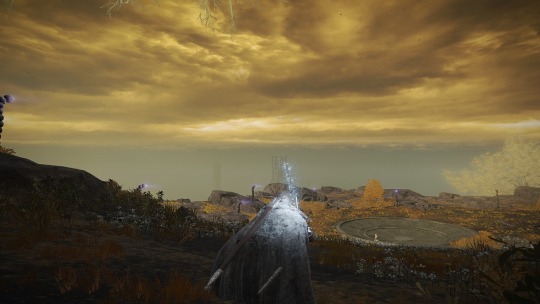
Gold
Colour of the current world age and the powers that forged it; domain of the Greater Will.
Gold seems to have been introduced to the Lands Between by the Elden Star - which brought the Elden Ring and the Greater Will's influence over the world.
In ER, Gold is commonly found as a 'tint' or 'layer' over preexisting things. For example; the Erdtree has a glowing canopy and a corporeal root. Similarly, the eyes of people in the Lands Between have a Golden glint within - to be Tarnished is to lose that glow.
Therefore, Gold does not create in the Lands Between, but rather brings existing physical creation into the Greater Will's sacred order? Pure or unalloyed gold does exist, but it is a recent development by Miquella - supporting the idea that Gold was previously only found in association with other things.
Additionally, Golden Order incantations (many from the Fundamentalist School) are considered a distinct school of incantation from the Erdtree. To me, this suggests that Gold is related to the fundamental power of Greater Will; as opposed to something that originates from Marika's Erdtree.
Yellow
Colour of the One Great; elementary stew of the universe.
The Frenzied Flame shares motifs with the Greater Will; their colour similarity and shared finger servants. (ie. the counterpart to cosmic order is primordial chaos?)
There's not much else to say here; the Gold-Yellow spectrum is related to fundamental laws of the universe - order and disorder.

Cool Hues; Blues, Purples and Cyans
Colour of the celestial bodies; the moons, stars and agents of gravity.
There is a clear cool hue spectrum of (purples-blues-greens) that spans the heavenly bodies of the night sky. Gravity agents in purples, mainline Glintstone magic leans toward the blue-cyan, Night and the Moons span pale to deep blues.
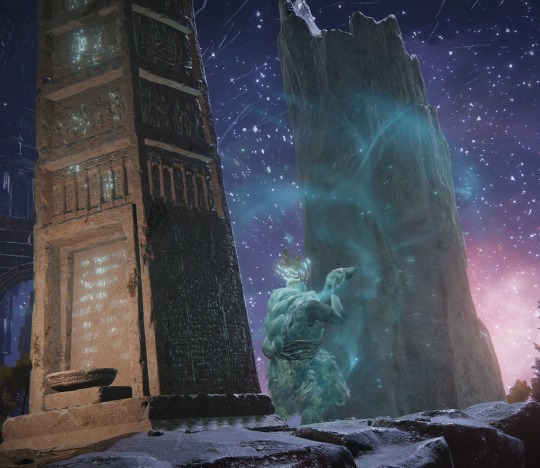
Spirits and Others
Besides the heavenly bodies, there purple-blue-green spectrum is also found among a few unrelated factions. Ancestral Worshipers, Spirit Summons and St. Trina/Sleep magic. These are all very enigmatic and don't have a clear connection to the stars, so I don't have much to say here.

Reds
Colour of the world, fire and life and possibly unity/convergence?
This probably the most 'out there' section, where I claim a connection between all the red coloured factions in the Lands Between. Also that there is a distinction between factions that are 'red only' and 'red-gold'.
The Formless Mother is a divine reservoir of burning blood and who is said to crave wounds. She is the source of Bloodflame Incants.
There is a theme of birth/new life in the Bloodflame faction; from the name of their deity to the fact that blood is involved. The spontaneously rise of flies from the blood swamp. Mohg's plan to found a new dynasty with Miquella using the power of Formless Mother.
Seeing the Formless Mother as a birth deity pairs well with the next red faction; the Scarlet Rot. The Rot God manifests as a decay that afflicts landscapes and even divine beings. Its motifs are flowers, stagnant liquids and insects.
The Ancient Gelmir/Great Serpent Cult seems to form a bridge between fire-life and glintstone (though the latter may be innovation by Rykard in more modern times?).
There are some parallels between the Formless Mother and Great Serpent. The Formless mother's devotees spread her blood, while the serpent devours its worshipers - uniting them as a single flesh. Both also have themes of fire - literal burning blood vs magma; which symbolically is the world's burning blood.
Therefore, 2 entities with fire-blood themes - one that gives it's blood to the many, another unites the many as one?
(there is maybe a caveat that the Great Serpent Cult and the Volcanic magic of Mt. Gelmir are not synonymous)
The Fel God/Giant's Flame does not explicitly have a life connection, but it does have a role in being the prophetic burning of the Erdtree; a source of boundless life (more on this later).
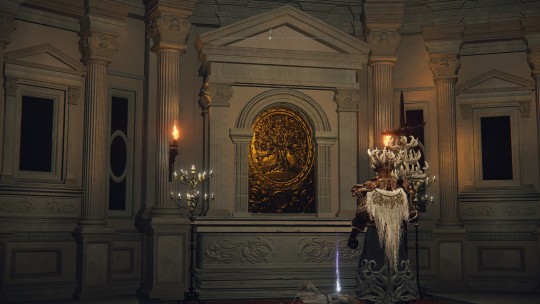
'Red-Gold'
The Crucible is the/a previous Erdtree, and is associated with rampant growth and chimeric beings. It's equipment is made of 'red-tinted gold'. Ancient Dragons wield Red lightning and have Gold plating their wings, they are associated with the timeless storm and ever-crumbling city.
Going to argue that 'red-only' is the 'nature's colour' in the Lands Between - the factions that bear it are associated with cycles of birth/life-decay/death and geological forces. Adding in the Giantsflame + Erdtree; cycles of forest fire perhaps?
Existence of ancient red-gold factions suggest that the Elden Star arrived deep in the past; and the Greater Will has influence on the Land's Between indigenous inhabitants for many ages.

'Red Death'
Red appears somewhat in death-related factions. The Deathbirds are associated with pale fire, but one of their weapons - Helphen's Steeple features a red gem. More strange is the Rune of Death; which seems to take on several colours - Red-gold in its 'full form' used by Maliketh, or colourless Blackflame as the 'sealed form'.
(There is also the dull yellow of Godwyn and associates, but that is not death-rune, rather the result of demigods slain by it?)
A distinct Elden Ring appears in Farum Azula; shwoing again the long history of Gold in the land's between.
Is Marika's innovation of removing death (red) from the ring the reason why her age is solely Gold and not gold-red like that of Placidusax; the previous lord of the Lands Between?
(again, this probably deserves its own post.)
'The Blood Star'
This one probably deserves its own post - but tldr; the only extraterrestrial source of red? Again very enigmatic. But note the manifestation of life in the form of thorns.
Summary
Gold-Yellow = fundamental universal forces, order/chaos
Cool Hues, Purple-Blue-Cyan = heavenly bodies
Red = terrestrial world
Deathbird, Red Glintstone, Sleep and Spirits are enigmatic
5 notes
·
View notes
Note
So with what we're learning about the subminds do you think that means that Malahayati is who hunted Felwinter and killed the Iron Lords or is that Rasputin as a whole? My thought is that in D1 it very much seems that that part of Rasputin is sectioned off - exactly as they're treating subminds now, for survival - and adding to that the fact that we retrieved Malahayati from the lunar seraph station with Felwinter's memorial in it.
I'll caveat this by saying I'm traveling during Week 2 and won't have a chance to play Destiny till Saturday at the earliest, so if there's new Week 2 info pertinent to the question, I don't know it.
An interesting question, and one that runs into a lot of fundamental unknowns about subminds. I don't think it was Malahayati in the Cosmodrome because we've met her before, pre-Collapse, and although she identifies herself as a submind she also speaks as if she were separate from Rasputin, more like an aide or deputy than one facet of a whole. So if we had been talking to her all along in the Cosmodrome I would have expected her to identify herself as, well, herself, not as Rasputin.
But that just raises more questions. What are subminds? This season treats them as fragments Rasputin sectioned himself into to survive when his central network was shut down. But when the warsat network fragmented during the Dark Ages the Earthbound part of Rasputin still identified himself as Rasputin, both to us and in his internal messages. So it's not just a network thing. And it’s not just a personality thing or post-Collapse Rasputin's incredible powers of denial and compartmentalization would have made one whether he wanted to or not. So submind creation is more deliberate. Was Malahayati therefore a distinct consciousness he intentionally spun off, like Felwinter? Is the Malahayati we're retrieving now the same as the one who existed during the Golden Age, or did she stop existing at some point and then get recreated?
I suspect the latter, if for no other reason than Rasputin the drama queen constantly declaring "I am alone.” The original Malahayati might have been killed during the Collapse - I can see a Rasputin submind getting hit with a noetic contagion and forcing him to sever its connection to protect the rest of himself - or he could have simply...re-absorbed? reclaimed? it. Post-Collapse Rasputin might have judged subminds a risk, especially if they couldn't all be corralled into MIDNIGHT EXIGENT, or wanted to consolidate his severely-diminished resources. Either way he kept the "pattern" of Malahayati somewhere in him (”those names live in me”?). It was a known-good solution for a semi-autonomous entity. Similarly the "kernel" proto-AI used by CB Corp was an early self-contained component of his self, like a standalone code module now absorbed into a bigger project.
I’m working on the theory that the Pyramid Fleet “killed” him by locally warping the vacuum permittivity constant to make space opaque to radio (the way it did in the Marasenna) and disrupting communication between all Rasputin’s warsats at once, causing his whole network to disconnect simultaneously. So when that happened he fractured, intentionally or not, not along regional boundaries but along these pre-existing faultlines in his consciousness - Malahayati, the proto-mind, the other subminds we’re going to meet. He cleaved apart into pieces that had once functioned semi-independently and could therefore disconnect again with the least overall damage, like a signpost hit by a car snapping along the breakaway bolts. So Malahayati was recreated.
I don’t think rebuilding him is going to be as simple, by the way, as “merge subminds, receive Rasputin.” I think both Clovis and Ana are wrong in thinking about him like a jigsaw puzzle to be reassembled. But that’s for another, much longer post.
#Destiny 2#the Warmind Rasputin#Season of the Seraph#Malahayati#everyone's been sending in such great questions#output generated#loremind#ra ra Rasputin Mars' greatest war machine#this is the wager of existence
37 notes
·
View notes
Note
I feel deep catholic guilt and discomfort whenever I see art that glorifies satanic stuff or even posts that are anti-God, even though I wasn't raised catholic. Is this normal for people. I'm personally very pro God even though people think I'm a devil worshiper based on my appearance and interests

it's fine that you vented, i don't mind
ftr im just some dude i can't offer significant advice (i'll take a shot) or speak for other people. im not particularly smart or insightful
tldr: you're not abnormal for it but religious guilt that interferes with your life is not good for you. you should speak with a therapist and take time for considerable introspection
catholic guilt is not the only form of religious or even christian guilt; many religions, notably (because i am from the west and most familiar with them) abrahamic ones, can cause or even deliberately wield guilt as an extension of ensuring faith. catholic guilt is often a distinction made because the catholic faith is notorious for its weaponization of guilt in its practice. if you experience religious guilt, but were never or are not catholic, it is not catholic guilt- this isn't, like, a defense of the concept, i just think making that distinction is important for someone struggling with religious guilt. knowing exactly what you're dealing with is important, you don't want to confuse it easily with something else
feeling religious guilt either because you were raised religious or because you live in a culturally christian (im assuming based off the question) society is not good for you, but it is arguably pretty normal. that being said it is absolutely something you should focus energy on and work towards overcoming and processing- there is no reason to feeling guilty and afraid of innocent, innocuous, and harmless behaviors, things, and actions, just because a flawed doctrine has demonized them arbitrarily. your moral compass, and the convictions you hold that's violations might cause guilt, should be held 100% of your own volition after your own careful consideration- not held because of fear, forced faith, or exclusively because of outside influence
religion itself is not a evil or bad, neither is it good and just. it is a neutral concept that is capable of an immense amount of beauty as well as an immense amount of ugliness. religious people are, the vast majority of the time, totally normal people with totally normal senses of right and wrong- whether it's strictly in-line with their faith or not; identical in this way to any non-religious person, or another person of any other faith
all i mean is that you should be considering what you belive and why- if you find it has no conflicts with your faith, that's perfectly fine. if you find it does, that's fine too. just make sure you make the choice on how to move forward in life for reasons of genuine conviction, compassion, and logic- nothing else. do not let anything else control you
if god remains important to you, then that's just fine. just make sure you have a healthy relationship with the concept- no nonsensical, arbitrary guilt
--
im not entity certain what "pro god" means but whatever it is i am likely not myself. i was raised with religious influences but i hold no genuine religious convictions of any kind. i resent aspects of christianity that have hurt myself and others, as well as many fundamental aspects of the christian interpretation of life and the world, so despite complete lack of faith, i frequently take jabs at the concept and often with a "pro satan" tone. this is all to say i don't think we can entirely empathize on that front, and whatever ive told you has been said with a low backing drone of resentment to the concept of of a christian god. i tired to be impartial in the above text, but it's important to make you potential biases known
hope all that texts literally anything at all to you 👍 sorry it makes little sense
8 notes
·
View notes
Text
I’m returning to an article I can remember reading and trying to seriously think through a few years ago—back around 2019. The article is Sandra Rosenthal’s “Continuity, Contingency, and Time: The Divergent Intuitions of Whitehead and Pragmatism,” published in the Transactions of the Charles S. Peirce Society in 1996. In the article, Rosenthal argued that there is “a fundamental chasm” separating what she calls “Whiteheadian and pragmatic process philosophies” (542). This separation derives from “different intuitions of the nature of time” that are then “inextricably intertwined with diverse perceptions of the nature and interrelation of continuity, discreteness, and contingency” (ibid.). This initial article actually incited a reply by Lewis Ford the next year, to which Rosenthal then wrote a reply of her own, and then Chris van Haeften wrote what was essentially a follow-up to those previous discussions in 2001. So from a certain perspective the whole thing was quite productive.
Reading through it now, though, I’m struck by just how poor the level of argument is—but then I’m also not especially surprised. Lately I’ve really been coming to the assessment that the scholarship on Whitehead is, in general, extremely poor. Maybe I’m being harsh, and in general you’re not bound to find that much legitimately good scholarship on any philosophy, especially more marginal philosophers from older time periods.
Rosenthal states, early on in the article, that “the philosophical search for the security of fixity, the fully definite, as well as the a-temporal, has survived surprisingly well in Whitehead's philosophy” (542-543). This is, in fact, true in a rather mundane and obvious way, so that Rosenthal has no warrant for appending “surprisingly” to her sentence. Whitehead always made it clear that his philosophy included both (1) entities that are fully definite and determinate (in many of the distinct ways we could importantly define either of those two terms) and (2) permanent entities, including even entities that are a-temporal (which, again, could apply given at least a couple distinct ways of defining a-temporality).
Whitehead does, after all, include something called “eternal objects” in his category of entities. Or, if we want to turn to one of his more poetic (and thus, on an initial read, more memorable) phrasings, take how, in Process and Reality, he cites these lines from a hymn:
Abide with me;
Fast falls the eventide.
He then writes, “Here the first line expresses the permanences, ‘abide,’ ‘me’ and the ‘Being’ addressed; and the second line sets these permanences amid the inescapable flux. Here at length we find formulated the complete problem of metaphysics. Those philosophers who start with the first line have given us the metaphysics of ‘substance’; and those who start with the second line have developed the metaphysics of ‘flux.’ But, in truth, the two lines cannot be tom apart in this way” (209). Later in the book Whitehead will refer back to these lines, and state his point again: “Ideals fashion themselves round these two notions, permanence and flux. In the inescapable flux, there is something that abides; in the overwhelming permanence, there is an element that escapes into flux. Permanence can be snatched only out of flux; and the passing moment can find its adequate intensity only by its submission to permanence. Those who would disjoin the two elements can find no interpretation of patent facts” (338).
So Rosenthal is not wrong to state that Whitehead retains a place for “fixity, the fully definite, as well as the a-temporal”, no matter her moralizing over it—and it’s a common feature running through this paper that she uses moralizing terms like the “security” above while discussing what are really pretty mundane things. So Rosenthal is also correct in noting that actual occasions, upon coming into existence, “do not change, do not alter while maintaining an identity” (543). Thus there is, as she put it, “a fully fixed, unchanging past” (ibid.). She seems to want this to be somehow shocking to the reader. She later criticizes Whitehead’s philosophy for the way in which “potentiality and actuality are fundamentally isolated, for becoming actual is a process of achieving definiteness, and the moment of attaining full actuality and perishing is at once the attaining of absolute definiteness. There can be no residue of potentiality in the fully actual or it would not be fully actual, fully definite” (552). She characterizes this as actuality and potentiality being “strangely separated from each other” (ibid.). Her characterization again uses moral terminology—“isolated” and “separated”—in the process of characterizing what seems, rather, to be the mundane and common sense position, and perhaps even the semantically tautologous position. A process that may possibly occur many different ways will, when it occurs, occur in just one definite way: it will be actualized, and once it is actualized, there is no longer any potential for it to go any other way: it is now in the past. That's, semantically, the difference between saying it's merely possible but not actual, and saying it's actual. None of this seems, in itself, at all shocking. There surely could be metaphysical premises accepted for one reason or another that contradict this and thus motivate us to not agree with Whitehead, but those are not obvious and the position in itself is certainly not “strange.”
This problem of possibility and actuality is in general treated in a confusing manner by Rosenthal. Take, for example, this passage:
Because of this absolute fixity of the past, Whitehead's system requires eternal objects to account for novelty. For, if the past provided everything for the present, then nothing new could appear; the apparently new would be merely a configuration of the old. Since the past is fixed and final, novelty is possible only by the intervention of something eternal or a-temporal; the future exists as possible in the form of inert, fixed, objective real possibilities. The ingression of eternal objects into events is Whitehead's way of getting contingency from a fixed, fully determinate past that cannot itself adequately allow for contingency and emergence. Every actual occasion introduces novelty into the world by prehending and newly integrating what the past sends to it, and it does this via a "lure" directed to the future through its prehension of eternal objects. (544)
What Rosenthal is discussing is the distinction between forms that may possibly characterize future actual occasions, and the actual characterization of actual occasions by such forms. Thus, in Whitehead’s philosophy, we may assert that it is possible for an actual occasion to be P—with some definite identity to the predicate P—before any such actual occasion characterized by P comes into being. Furthermore, from one occasion to the next, this characteristic P is identifiably that same characteristic. That is to say, the characteristic P is necessarily P—it has a definite identity independent of any realization in spatiotemporal events and thus can’t be said to come into being at some point in spacetime, so that it is eternal (hence, it’s an “eternal object” in Whitehead’s terminology). But the actual characterization of an event as P is itself contingent: it might occur, and it might not.
So, when a new actual occasion comes into being it will be feeling a given actual world, consisting of already satisfied actual occasions that will all have their own characteristics: the past is determinately of one character and not another. You can’t change what’s already happened. The new actual occasion is capable of realizing forms of activity not already actualized in this world, due to the nature of eternal objects described above whereby they have their identity as forms of possible activity independently of any actual activity. This is the basic gist of it, but it formulates the position in a hopefully less confusing manner than Rosenthal’s language (though, to be fair to Rosenthal, Whitehead was himself confusing). She barely really touches on the actual premises to be argued over, one way or another.
But ultimately the worst features of the paper come through with the discussion of Whitehead’s theory of extension. There, Rosenthal does not appropriately distinguish between two entirely separate (though certainly related) aspects of creativity: (1) extension as a feature of the physical prehensions of the actual occasion, and (2) the linear succession of actual occasions through the creative advance (and, similarly, the linear succession of prehensions within phases of the concrescence of one actual occasion). Thus, she argues that time, in Whitehead’s philosophy, “is ultimately understood in terms of discreteness. Time is a result of the succession of actual occasions, and hence though time seems continuous to the observer, it is actually atomic in its development” (543). But the above is certainly not true of time as temporalized extension. She further argues: “Actual occasions, then, are temporal atoms or temporal building blocks, but are not themselves temporal. Each one is an indivisible epoch having no internal temporal phase” (543). Here, however, she is again producing paradox where it is not necessary, by not distinguishing between different senses of time. Whitehead argued that temporal extension is only one feature of the concrescence, whereas Rosenthal was discussing time’s arrow and the fundamental asymmetry of becoming, something not explicable in terms of temporal extension. In the same way that actual occasions relate to each other in an asymmetrical, linear manner, so too do prehensions: this is entirely distinct from extension, which is a characteristic of physical prehensions (i.e., relations between actual occasions).
I won’t bother arguing any further with the text, as I’m well aware that I’m entering the point where basically no one is familiar with what Whitehead’s really doing here—and that’s including Whitehead scholars--so that I'd need to write a lot to really unpack what I'm saying. What I'm most interested in, now, is distinguishing the formal properties of how actual occasions, as atomic unities, aggregate into nexuus, from the formal properties of extension as that characterizes a specific type of relationship said actual occasions enter into. This would be, I believe, the difference between a mereology not reducible to topology (i.e., a mereology where the relation of parthood is not reducible to topological enclosure), and a mereology that is so reducible to topology (i.e., the mereology of Part IV of Process and Reality).
4 notes
·
View notes
Text
Godzilla Has A Cthulhu Problem (Review of Monarch: Legacy of Monsters)
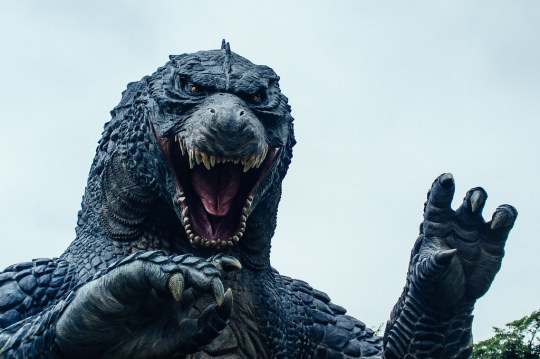
Kaiju -- including Godzilla -- have a Cthulhu problem.
At least, when it comes to Legendary's film "MonsterVerse" franchise.
FYI: No spoilers that you can't get from seeing the trailers for "Monarch: Legacy of Monsters", "Godzilla vs. Kong," and "Godzilla x Kong: New Empire."

The early form of what became the Cthulhu Mythos {1} was, at its best, pure nihilistic cosmic horror. The Great Old Ones and Outer Gods penned by Lovecraft, Howard, Lieber, Moorcock, et al -- Cthulhu, Yog-Sothoth, and the rest -- are not merely big monsters, but effectively forces of nature that are not malevolent so much as completely indifferent to humanity. Rather like the way humanity regards, say, ants.
And then came along August Derleth. Derleth's efforts were absolutely instrumental in preserving and maintaining these works. Derleth even coined the name "Cthulhu Mythos"!
However, Derleth also added in his own stories, which altered the entire tone so much that his works are sometimes called the "Derleth Mythos" to emphasize the distinction. Derleth's Christian world-view muddied the cosmic horror elements, even going to far as to add quasi-benevolent entities that could oppose the existing amoral Great Old Ones.

This impulse is completely understandable -- nihilistic cosmic horror is intended to be deeply uncomfortable -- and has more than continued since Derleth's death.
I'm just as guilty of this as anyone; right now, I have a crocheted Cthulhu plushie, wreath, and finger puppet all within my sight.
That said, there is a CTHULHU SQUISHMALLOW, for crying out loud.
By making the Great Old Ones into simply "the big bad guy" or something cute, it makes that horror comprehendable and manageable.
Which completely undermines the entire point of the Mythos.
Cosmic horror is not "there's a big critter out there that can eat me." Cosmic horror is the inescapable realization that the universe is a place so large, so vast, that we cannot possibly comprehend it. So large, so vast, that all of our mighty struggles and triumphs and defeats, every act of valor and courage and triumph and defeat, are as utterly unimportant as the fate of a single bacterium on a drop of water somewhere in the sea.
That space beyond human understanding is also the space that Godzilla -- and other kaiju -- inhabit.
Godzilla's roots are in Japan's trauma from nuclear weapons and a society trying to come to grips with this force that is so indiscriminately destructive. That trauma is a clear parallel to the horror that the Cthulhu Mythos conveys. Godzilla is a force of nature, fundamentally unknowable. You cannot reason with Godzilla; merely get out of its way and hope it does not notice you.
The single best line in Godzilla (2014) knows this.

There is no way that humans can manage -- let alone defeat -- the kaiju. Ishiro Serizawa (Ken Watanabe's character) knows this. The best he and humanity can hope for is that the kaiju that is least problematic for humanity wins.
Not the one that is on humanity's side. The one that is least problematic.
The distinction is vital. This is their world; we just happen to live on it.

This sensibility is perfectly done in the Apple TV series "Monarch: Legacy of Monsters". I initially approached it skeptically, but in ten episodes it manages to hit all of these notes perfectly well, solve most of the plot problems in the Legendary Godzilla franchise {2}, and got me to care about Monarch, the characters, the story, and even Godzilla itself. The plot is clever, the characters believable, and it is perhaps the best Godzilla story I have ever seen on screen. {3}
"Monarch: Legacy of Monsters" is so good it even got me to forget the train wreck of "Godzilla vs. Kong" for a while.
Then the day after the series finished, I saw the trailer for "Godzilla x Kong: The New Empire".
I have problems with counting Kong as a kaiju, even though Legendary seems hellbent on doing so. Kong -- unlike Godzilla or Cthulhu -- is not unknowable. While Kong is not able to be tamed or controlled, Kong is understandable. He -- like us -- is an ape. Even in the original, Kong is moved by empathy towards Fay Wray, though humanity (in the film) does not return the favor.
But place him alongside Godzilla, and suddenly Kong is a stand in for humanity. Kong suddenly represents understanding and empathy and compassion and struggle and, eventually, triumph in the face of a nihilistic universe that does not care.
By including Kong as a peer of Godzilla, the tone immediately shifts from cosmic horror toward action movie. "Godzilla vs. Kong" -- aside from not understanding either of these themes -- was overstuffed and underwritten, fumbling plot point after plot point in service of "oh, that'd look cool" without thinking about what would make it cool.
I guess the difference is here: In the last episode of "Monarch: Legacy of Monsters," the plot builds in such a way that a final reveal hits, even though I knew it was coming. I knew it was coming early enough that I stood up and turned off the overhead light (it was glaring on the TV). My amour started to ask why, but I just said, "Wait."
The reveal was glorious. It was fulfilling and satisfying while simultaneously evoking a sense of horrified awe.
Nearly every episode of "Monarch: Legacy of Monsters" pulled that off.
I did not get that feeling -- not once -- from "Godzilla vs. Kong."
Regardless, the first minute of the trailer for "Godzilla x Kong: The New Empire" seemed to tack back toward that cosmic uncertainty, with a voice-over emphasizing the limits of human understanding.
But then there is a shot of a cute mini-Kong, followed quickly by these lines of dialogue:
"Kong can't face this on his own."
"He won't be alone."
And then this image of Godzilla and Kong doing the "superhero team-up dramatic run" toward an enemy.


The second trailer is worse, doubling down on dumb discredited ideas about "alphas", ignoring the work that "Monarch: Legacy of Monsters" did to make the Hollow Earth idea less stupid (largely by still calling it the "Hollow Earth"), and then giving us THESE lines:
"Kong is going to need some help."
"Godzilla is on its way."

Look, I get it. My inner five-year-old went "OOOH," because that's exactly the sort of thing I would have done with my toys when I was a kid. I understand the impulse that made Legendary want to pit two big critters against each other. I like seeing really cool visuals and effects.
But it completely fails in the way that "Monarch: Legacy of Monsters" succeeds.
Legendary's kaiju franchise -- at least, in films -- is a stuffed plush Cthulhu, filing all the uncomfortable and disquieting edges off in order to sell something more palatable.
They are big, dumb movies that turn cosmic horror into action figures. Literally.
Yes, it looks pretty. And the trailers use swelling, rising music to great effect to try to make these absolutely dumb things seem inspiring by confusing our limbic systems.
Normally, I wouldn't care. I would just continue to not particularly worry about it the same way I've not worried about the live-action Transformers franchise for ... well, all of them since the first one. I'm not just out to yuck someone else's yum here.
But damn "Monarch: Legacy of Monsters" for showing us how much better it could be. For being so damn good that it made me care just in time to be disappointed again.
{1} Obligatory acknowledgement of the straight-up xenophobia and racism of Lovecraft, which is not the point here.
{2} I've yet to see "Godzilla Minus One"; however, "Shin Godzilla" produced such a ludicrously funny-looking version of Godzilla that I cannot take that film seriously.

{3} John Scalzi's The Kaiju Preservation Society is near the top for non-filmed kaiju stories overall. HIGHLY recommended.
Featured photo by Fabian Reus on Flickr under a CC-BY-SA license.
Read the full article
3 notes
·
View notes
Text
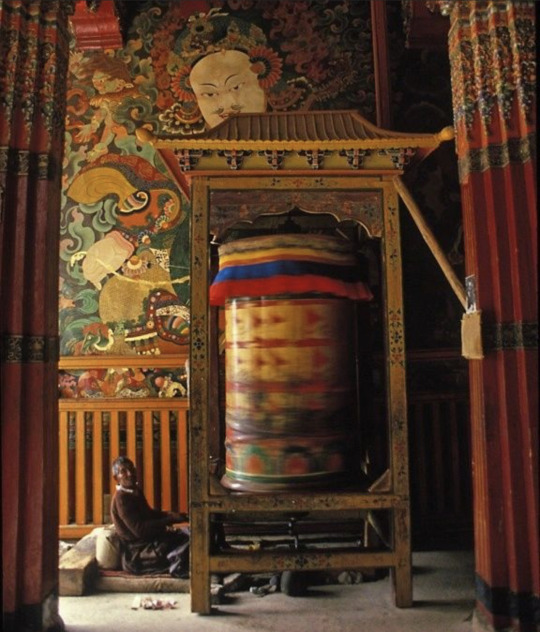
What is the concept of dualism in Tibetan Buddhism and how does it relate to the belief in the interdependence of all things?
In Tibetan Buddhism, dualism refers to the perception of reality as consisting of distinct and separate entities, such as self and other, subject and object, or good and evil. This dualistic view is seen as a fundamental obstacle to spiritual progress, as it reinforces the ego and attachment to material existence.
However, Tibetan Buddhism teaches the concept of non-dualism, which emphasizes the interconnectedness and interdependence of all things. This perspective sees all phenomena as arising from the same ultimate reality and thus devoid of inherent existence or independent selfhood.
The practice of meditation and other spiritual disciplines in
Tibetan Buddhism aims to dissolve the dualistic perceptions of the mind and cultivate a direct experience of non-dual awareness. This allows practitioners to transcend the limitations of the ego and realize the true nature of reality.
-------
To cause yourself and your life to be intensely filled with happiness, do everything you can to give happiness to others.
Do all the good you can. By all the means you can. In all the ways you can. In all the places you can. At all the times you can. To all the people you can.
As long as ever you can.
May you be well and happy my friends.
I am grateful for your interest in Dharma and following my blog.
Any mistakes are solely my own and not the fault with the Dharma or masters quoted here.
#buddha#buddhist#buddhism#dharma#sangha#mahayana#zen#milarepa#tibetan buddhism#thich nhat hanh#dhammapada#karma#mindfulness#dakini#four noble truths#pure land#equanimity#avalokitesvara#manjushri#bodhisattva#tsongkhapa#padmasambhava#amitaba buddha#atisha#shantideva#vajrapani#vajrasattva#vajrayogini#medicine buddha#green tara
16 notes
·
View notes
Text
okay I NEED to write a post that’s not just me taking the piss out of my mind palace and I need to write it like RIGHT NOW because I WANT to admit that there are things I’ve said that I think could be better or more accurate. there ARE bits and pieces I’ve neglected . and there are things that I haven’t articulated yet that I want other people to KNOW ABOUT!!!!
like with things other than himself masato’s poker face kind of sucks. with his older brother he’s way more open about how he feels, but he’s still not saying some critical SOMETHING. masato and tashiro, sometimes, occasionally, (frequently) just talk very easily. their dynamic is like astonishingly….. nuanced? like some days it’s taaaaashiiiiiiiiroooooo-kuuuuunnn and other days it’s

and some days, in my mind, masato is sitting very quiet and still watching tashiro do nothing in particular, and he’s torn between wanting to run away and stay right where he is until he stops breathing, or at least until his heart stops beating so damn hard.
and I definitely haven’t highlighted enough how legitimately functional and . well. “normal” . masato is externally despite his nights being plagued by dreams. or how so much of his angst is because, despite everything, he’s still just as young at heart as his friends are. in the space of his family, he’s still just a kid. he’s not unflappable he gets flustered and caught off guard he’s silly and expressive but he’s hard as hell to read sometimes. he lurks around corners. he’ll oscillate wildly between reflective and flippant. he’s PETTY.


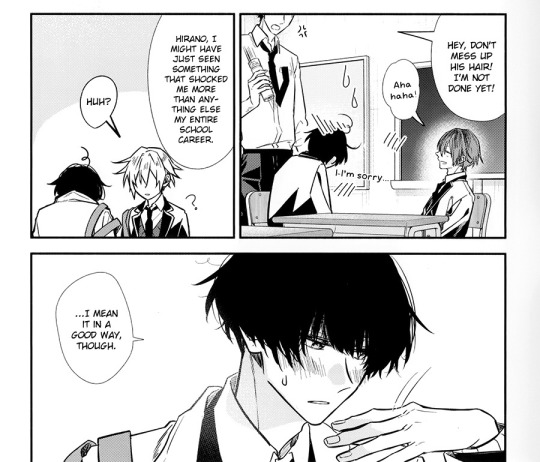



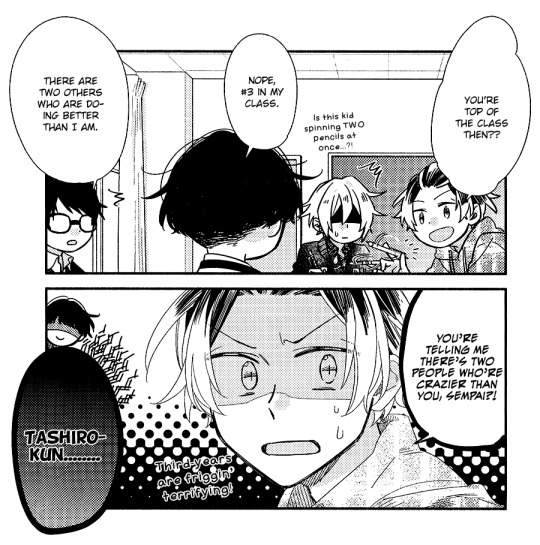
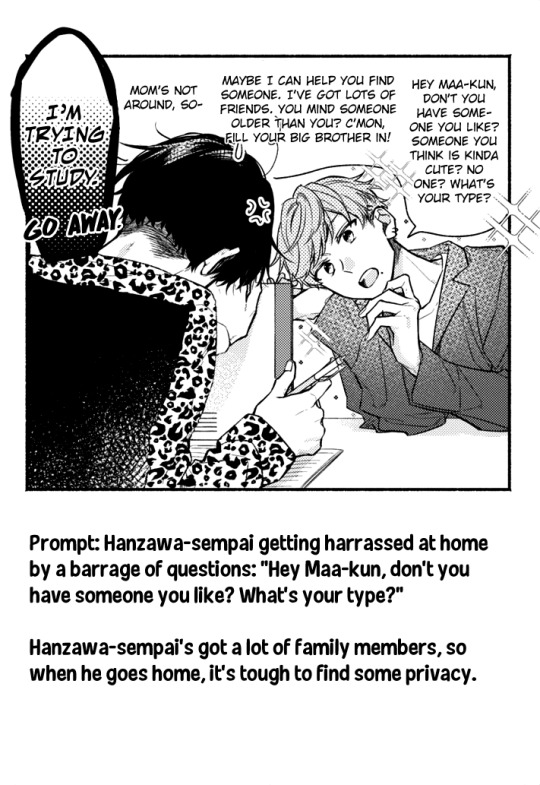
he’s someone younger brother, and he’d rather be at his death bed than admit whatever fundamental something it is that he’s avoiding so hard.
like it’s. meaningful, that’s something I haven’t really gotten to. it’s meaningful that masato is always a few steps away from death, or half a dozen steps past it. he can even wear a detectives hat—it might be the only way he would ever, EVER open up. like. I’m going to loosely quote sunnnfish’s textbook but You can do things to a dead body that you can’t do to a living one.
but I also think that if I went back and altered the. dirtbrain hanzashiro canon, I guess. I’d make it easier to remember that masato isn’t 100% steeped in miseries. because I definitely think that I make it sound like that. like I should say that I don’t revel in his misery. not because it’s true necessarily but because I put so much of myself in front of and also into him that it reflects badly on me if I don’t. but anyway he still has his fun his distractions work it’s just that he’s plagued by dreams. the river is the metaphor for his burdens. that’s the bottom line. so it’s not that he’s being plagued by feeling nervous AND the river. they’re the same. the river is a prominent image in his mind, as it is in mine, but when he thinks of it he’s not thinking of it as the physical manifestation of his burdens, he’s not tying them to the river. they’re distinct in his mind, because he refuses self reflection.
also I’d play into the crime scene thing more. I like masato I want him to have fun and I think he deserves to wear a detective’s hat and dance around dgs holmes style. even if he does still have that massive puncture wound in his chest. even if he is still bleeding all over. like masato’s a weirdo but he’s not in isolation, is what I mean. not practically. he isolates HIMSELF but that’s because he’s ashamed of his vulnerability, not because of any external rejection. he has fun, still, but when he grows quiet, when his eyes open, when his expression is, ironically, even harder than usual to read, he’s being burdened by himself. but otherwise it is out of sight out of mind and hanzawa masato does so enjoy being silly and weird.
the thing, though, is that tashiro, from his outside perspective, DOES think of the river as it’s own entity. how could he not. he hasn’t been filled in yet on the things masato’s been putting up with in that freaky head of his, so he thinks of a river washing hanzawa senpai up like any regular corpse and it’s.. scary! if he could, masato would dance around his own corpse, investigating the lividity and wound in his chest with detached enough vigor, but tashiro isn’t like that. tashiro CAN’T be like that. tashiro had been surrounded by red lighting, flickering, buzzing, and saw the body in the water, and decided that he was here to do something, and he went and pulled him out and bandaged him up. which is a scene I’ve been struggling to write. and obviously “decided” is a bit misleading, because there was nothing else to do. like what sort of demon would tashiro have to be to see someone floating down a river in a scary environment like this and just LEAVE them there?
it’s like as far as chronology goes tashiro’s interactions with the river are complicated. because in MY chronology like as in the order they were written by me. in my capacity as writer. tashiro’s in reality first, only seeing trace unrealisms following masato around (the lanterns in the hallway, the blue hour, etc.) but in THEIR chronology. tashiro, who’s unacquainted with dreams mostly, suddenly is viscerally aware that he’s in one, and there’s a river in it. and while I haven’t gotten to saying so explicitly yet, like with a lot of things, the closest tashiro gets to being in the river is a dangled foot over the side of the pavement, skimming it. not taking a proper step into that world, but getting a feel for it. and then he takes hold of masato’s wrist, then hand, and pulls him out of the murk. bandages him up. mapping intimacy, hands brushing against masato’s ribcage.
and it’s obvious for me to say, I live in my brain and all of these details click together in ways that are mostly going unnoticed, this is before any realizations are fulfilled on tashiro’s part. he’s doing this because he found hanzawa senpai basically Dead in a river and he could help. he’s doing this because he’s himself. he’s doing this because he has no idea why else he would be here.
it’s just like. dirtbrain’s hanzawa to tashiro is a struggle between my capacity as a writer and my understanding that I could tell the story I want to tell so much better in a visual medium that I don’t have access to. so basically while I work out my own shortcomings everyone join hands with me so we can send harusono sensei psychic pleas for news on hanzawa to tashiro. or at least the over 10000 words on hanzawa masato. etc.
#hanzawa to tashiro#AUGH. artistic expressions tiring. i need a drink#sorry for a long post that’s not. 100% one thing. but also i’m really not i could have spent allllll day today#finishing up the post i started last night that RAPIDLY spiraled out of control. that one’s probably two separate posts if done right#and again neither of them particularly narrative in any meaningful capacity. but one points out a detail i’ve been stuck on since august#and the other serves much the same purpose as this one in trying to fill everyone in on the Dirtbrain canon#so that i don’t try to fit all that context into the narrative ones. it’s for the greater good. sort of#really i think i’m due for a media consumption marathon where i’m not trying to actually CREATE anything#but all those posts about how making art i don’t necessarily love is better than keeping it in me. because it’ll make me sick if it festers#yeah. that. whatever. so in the meantime i’m crawling back to being an ideas guy#and as we all know. ideas guys of my caliber just can NOT shut the fuck up. love and light#dirtbrain digression
23 notes
·
View notes
Text
The power of marketing
Subtitle 1: Unleashing Brand Potential
In the dynamic landscape of business, the power of marketing stands as a formidable force, capable of transforming obscure entities into household names. Marketing is not merely about selling a product or service; it's about crafting a narrative that resonates with the audiens Brands leverage marketing strategies to create a distinct identity, forging a connection that extends beyond transactions. From Coca-Cola's timeless 'Share a Coke' campaign to Apple's minimalist allure, successful marketing has the ability to etch brands into the collective consciousness.

Effective marketing is not confined to a single channel. In the digital age, it spans social media, content creation, influencer collaborations, and more. The strategic amalgamation of these elements propels brands into the spotlight, creating an ecosystem where consumers not only buy but advocate. The power lies not just in the product but in the emotions, stories, and experiences woven around it. Brands that harness this potential find themselves not just surviving, but thriving in the fiercely competitive market.
Subtitle 2: Navigating the Digital Frontier
The digital revolution has fundamentally altered the marketing landscape. Gone are the days when advertisements were confined to print and television. Today, the internet is a vast canvas where brands paint their narratives. Social media platforms have become bustling marketplaces, and search engines act as gatekeepers to consumer attention. The power of marketing in the digital age lies in the precision with which it can target specific demographics, analyze consumer behavior, and adapt strategies in real-time.

Search Engine Optimization (SEO), Pay-Per-Click (PPC) advertising, and content marketing are pivotal in enhancing a brand's online visibility. The ability to engage with consumers on a personal level through social media fosters a sense of community. A tweet or a post has the potential to go viral, propelling a brand to unprecedented heights. Digital marketing not only broadens the reach but also provides a treasure trove of data, enabling marketers to refine their strategies and create tailored campaigns.
Subtitle 3: Beyond Transactions - Building Relationships
While marketing is undeniably a catalyst for transactions, its true power lies in building lasting relationships. In an era where consumer choices are abundant, brand loyalty is the differentiator. Marketing goes beyond the initial sale, nurturing a continuous dialogue with the consumer. Email campaigns, loyalty programs, and personalized content contribute to an ongoing relationship that extends beyond a one-time purchase.

The power of marketing is exemplified by the ability to turn customers into brand advocates. When consumers feel a connection, they become vocal supporters, sharing their positive experiences with others. This organic form of marketing, often fueled by word-of-mouth, is a testament to the enduring impact of well-crafted marketing strategies. In essence, marketing is not just about selling a product; it's about creating an experience that resonates, fostering a relationship that endures.
#digital marketing services#social marketing#online marketing#search engine optimization#content marketing
5 notes
·
View notes